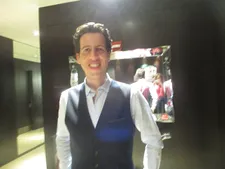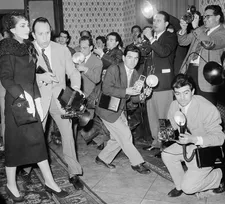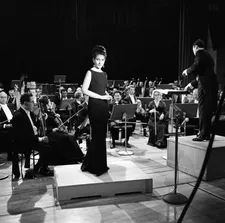![Tom Volf on finding the interview by David Frost with Maria Callas: "[It] was a real key to understanding how she had to cope ..."](/images/newsite/David_Frost_Maria_Callas_600.webp) |
| Tom Volf on finding the interview by David Frost with Maria Callas: "[It] was a real key to understanding how she had to cope ..." |
Tom Volf's standout Maria By Callas on Maria Callas, with the voice of Joyce DiDonato screened as a highlight in the Spotlight on Documentary programme of the 56th New York Film Festival last month. Personal letters and unpublished memoirs were voiced by Fanny Ardant when the film came out in France at the end of last year.
 |
| Maria By Callas director Tom Volf at Langham Place in New York: "The duality between Maria and Callas, that is a thread throughout her life." Photo: Anne-Katrin Titze |
The documentary fashionably transports you into the world of a great artist with recordings from radio and clips from television interviews, including with David Frost, Edward R Murrow, and Barbara Walters. Jean Cocteau, Brigitte Bardot, Elizabeth Taylor, Grace Kelly, Catherine Deneuve, Vittorio De Sica, Pier Paolo Pasolini, Anna Magnani, Luchino Visconti, Omar Sharif, Winston Churchill, Edward and Wallis, the Duke and Duchess of Windsor, are among those seen orbiting around inimitable Maria Callas.
The film takes its time; Callas performs entire arias, we hear the applause and we also get a glimpse into what she calls the "saddest evening in her career" when in Rome in 1958, she walked out on a sold-out performance. There is enough contradictory footage about her infamous relationship with Aristotle Onassis to draw our own conclusions about who was playing whom.
Headlines, bronchitis, the press in an uproar, a terrified star "swamped with fear" - Volf nimbly does not untangle the drama for us. Nor does his film try to answer exactly why she was fired from The Metropolitan Opera. Often you see the truth in her face, not in her words.
Anne-Katrin Titze: The film came out of the book [Maria by Callas: In Her Own Words] you did?
Tom Volf: Not at all. The book came out of the film. The film was the first and foremost project. Out of the material that I discovered for the film, including never-before-seen photos, came the idea of making a book. To make it like a …
 |
| Tom Volf on Maria Callas: "She never had PR, ever. Throughout interviews she would always be very honest and that's quite striking to me." |
AKT: … companion piece?
TV: Exactly, companion piece - like a full experience. Both have the same title and both are a journey in her own words.
AKT: You jump right into the the question raised by the title with the first interview in your film, which is from 1970. Is there a split between Maria and Callas, the private and the public figure?
TV: Right.
AKT: You are never really answering it. Your film circles around the question.
TV: I'm not the one answering questions here. She's the one answering questions. And I'm trying to give her rein and a context to allow her to express herself and answer those questions.
AKT: It is a complicated question.
TV: It is a very complicated question and I like the fact that when the audiences watch the film, they don't have a judgement from the director that is imposed upon them. Rather the film allows for people to make their own opinions.
It is such a fresh approach for someone like Callas about whom so many opinions have been imposed over the years by journalists and writers and everyone that spoke about her that kind of imposed their own opinion. I often get the question in Q&As after screenings "What do you think of Onassis?" That's just one example. I like the fact that everyone can have their own understanding about it.
 |
| Tom Volf on Maria Callas in Maria By Callas: "We allow time in the scenes and at the same time we're not losing the tempo, that was the crucial thing." |
AKT: "He was charming and very sincere." That's what she says. Another duality, perhaps?
TV: The duality between Maria and Callas, that is a thread throughout her life. And discovering that interview [with David Frost] that was considered to be lost in over 50 years, was a real key to understanding how she had to cope, but ultimately how she had to sacrifice one for another constantly.
AKT: Listening to these interviews, where she says that she would have wanted children, for instance, made me wonder. Did she feel at the time that she had to say this? Is it what she feels or is some of this imposed onto her as PR?
TV: No. She never had PR, ever. Throughout interviews she would always be very honest and that's quite striking to me. The consistency she has throughout the interviews is the honesty with which she replies. She answers interviews in the same way that she writes letters for her private correspondence.
Whenever she expresses her need of having a happy family and children, it is an intrinsic need for her since she was very young. Because she never really had a happy family; she never had a happy childhood.
Had she wanted to just fit into society, she would not have filed for divorce in 1959 in Italy, conservative Italy with a husband who then didn't grant her the divorce. That was the law, if the husband didn't agree, she couldn't get a divorce. And then for years living this relationship with Onassis in the public eye, as an affair almost. And after the marriage with Jackie becoming the second woman - all of that is a huge responsibility as a woman and a very modern and bold statement for the time.
![Tom Volf: "Had she [Maria Callas] wanted to just fit into society, she would not have filed for divorce [from Giovanni Battista Meneghini] in 1959 in Italy …"](/images/newsite/Maria_Callas_2_225.webp) |
| Tom Volf: "Had she [Maria Callas] wanted to just fit into society, she would not have filed for divorce [from Giovanni Battista Meneghini] in 1959 in Italy …" |
AKT: In 1937 the family left from the US to Greece and Callas spent the war years in Greece. You don't go very deep into that time. Because she didn't?
TV: No, she didn't. We all know what the war was. It was very hard and she says it from the beginning.
AKT: I like very much how you take time in this film. You give us entire arias, there is no rushing through. You show all this wonderful footage of airport arrivals - which I love. The tempo of it is beautiful.
TV: I like the word tempo. It is really the tempo in this film. It was very subtle to find the right tempo. We allow time in the scenes and at the same time we're not losing the tempo, that was the crucial thing.
AKT: To quote Tosca, "I offered my singing to the stars in heaven." That's her.
TV: Absolutely. And to her audience, and to the public. Transcending even her own death. Because she reaches audiences even nowadays. A whole new generation is discovering her nowadays.
AKT: Also through your film. I mentioned the airport arrivals. It's wonderful to see how her style evolves.
TV: Throughout the three decades! It's interesting because the major pivotal moments in her life where right at the pivot of the decades, from Fifties to Sixties and from Sixties to Seventies mainly.
You see how much everything changes - her style, her haircut drastically changes at the turn of each of the three decades. It shows you what happened in fashion but also how she would be an instigator of a style up to the Seventies. The style of the icon, the living legend that she had become.
Maria By Callas opens in the US on November 2.





















